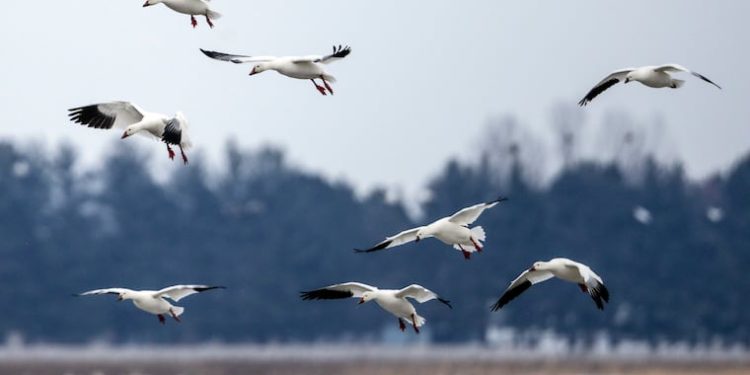A snow goose in West Philadelphia’s Carroll Park neighborhood is the first suspected case of highly contagious avian flu spreading among birds and livestock across the country, state health officials said Wednesday. Philadelphia.
The goose was found Jan. 11 in the 1200 block of North 59th Street, officials said in a news release, and preliminary testing by state agriculture officials indicated that the bird was suffering from avian flu.
A person in the neighborhood noticed a goose acting strangely, exhibiting “unusual neurological symptoms,” and notified animal health authorities, said Dana Perella, manager of the city health department’s acute communicable disease program.
Neurological symptoms of avian flu, a strain of the H5N1 virus, include dizziness or unsteady walking. The goose was evaluated, immediately euthanized and sent to the state Game Commission for testing, Perella said.
“The potential for transmission is very low for city residents,” Perella said. The greatest concern is for those who have close contact with sick animals.
Cases of bird flu in humans
More than 60 people have tested positive for bird flu nationwide and one has died, Philadelphia health officials said.
No human cases have been reported in Pennsylvania and New Jersey, but last month Delaware reported a probable case of H5N1 in a person that could not be confirmed by further federal testing. That person has since recovered, Laura Matusheski, a spokeswoman for the Delaware Department of Health, wrote in an email.
The vast majority of human cases in the United States involved people who had direct contact with an infected animal.
In the Delaware case, it is unclear how the patient was exposed to bird flu. According to data from the Centers for Disease Control and Prevention, only three of the 67 confirmed cases in the United States have unknown sources of exposure.
Officials said anyone in Carroll Park who had direct contact with a sick goose around Jan. 11 should call the city Health Department’s Disease Control Division at 215-685-6741.
In general, Philadelphians should stay away from wild birds, especially waterfowl like geese and ducks, and report any sick or dead birds to the Pennsylvania Game Commission. Residents can call 833-PGC-HUNT, email pgc-wildlifehealth@pa.gov or report the bird through the state’s online wildlife health survey.
The national spread of bird flu
Nationally, the spread of avian influenza in livestock since 2022 has prompted states, including Pennsylvania, to step up testing and quarantine efforts. Pennsylvania recorded a high number of cases in domestic herds early in the outbreak, but has so far recorded no cases of avian flu in cattle.
About 200 snow geese were found dead in Lehigh and Northampton counties earlier this month, and health officials said preliminary state testing confirmed bird flu.
The H5N1 virus binds poorly to human respiratory cells, meaning it cannot spread easily from person to person. The virus could become a greater threat to humans if it mutates and becomes more capable of latching onto receptors in the respiratory system.
Researchers at the University of Pennsylvania have helped track the virus through a livestock testing program, and others are developing an mRNA avian flu vaccine that was in clinical trials at the end of last year.
The city is also looking to ramp up its human testing efforts. Earlier this month, the CDC recommended hospitals test for H5N1 in respiratory samples from patients positive for influenza A but negative for seasonal flu subtypes typically found in humans .
“We are working on the feasibility of doing this with our local institutions,” Perella said.
Protecting domestic birds in the city
Anyone raising chickens in the city should also monitor the birds for disease.
According to the city health department’s website, symptoms of bird flu include sudden death without any prior illness; a lack of energy or appetite; decreased egg production; swelling or discoloration of a bird’s eyelids, crest, wattles and hocks; panting; coughing or sneezing; trip or fall; and diarrhea.
Residents can also prevent the spread of bird flu from wild birds to domestic birds by keeping food and water out of reach of wild birds and changing clothes and shoes after caring for birds and before entering in their house.
Residents who think their backyard chickens might be sick should call the State Office of Animal Health and Diagnostic Services, which operates a 24-hour hotline at 717-772-2852, option 1 .
Although birds can shed the virus in feces, mucus and saliva, health officials are more concerned about people who have more prolonged interactions with birds.
“The worry is greater if you had a flock in your yard and you were cleaning up after them than if you accidentally touched bird droppings,” Perella said. “The cases we have seen in humans have most often involved more direct exposures to affected animals.”
Public health officials have also warned against drinking raw, unpasteurized milk because it can contain the virus. The high temperature pasteurization process deactivates the virus.
Residents should also avoid cheese made from raw milk, the city health department said, and cook poultry, eggs and other animal products to safe internal temperatures to kill the virus. They also advise washing your hands with soap and water after handling raw meat and raw eggs.
Editor’s note: This story has been updated with additional details on the outbreak and comments from the Philadelphia Health Department.
Staff writer Sarah Gantz contributed to this article.


